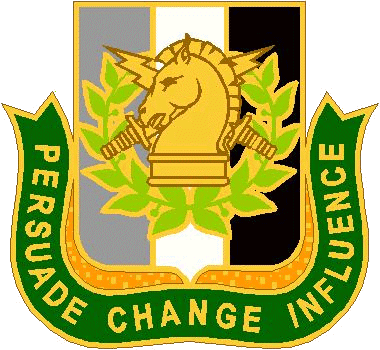
PSYOP has long had problems being PSYOP. Overseas they often work as “Military Information Support Teams” (MISTs). If you want to get them significantly spun up, try to discuss with them “perception management” or “deception.” Try that and they tend to go to ground very quickly. As for nefarious, spooky, and master manipulators, US PSYOP has always been dwarfed by the British; e.g., “Soldatensender Calais,” documented in Sefton Delmer's “Black Boomerang.” Personally, I just don't think the current Executive Branch of the USG has the will to play a full-up, full-spectrum game in the national security/foreign policy arena. Now, soon, or later, we will pay for that in needless loss of life. Remember always John Stewart Mill: “War is an ugly thing but not the ugliest of things. …”
“Psychological Operations” Are Now “Military Information Support Operations”
 By Kevin Maurer
By Kevin Maurer
Associated Press
July 2, 2010
The Army has dropped the Vietnam-era name “psychological operations” for its branch in charge of trying to change minds behind enemy lines, acknowledging the term can sound ominous.
The Defense Department picked a more neutral moniker: “Military Information Support Operations,” or MISO.
U.S. Special Operations Command spokesman Ken McGraw said Thursday the new name, adopted last month, more accurately reflects the unit’s job of producing leaflets, radio broadcasts and loudspeaker messages to influence enemy soldiers and civilians.
“One of the catalysts for the transition is foreign and domestic sensitivities to the term ‘psychological operations’ that often lead to a misunderstanding of the mission,” McGraw said.
Fort Bragg is home to the 4th Psychological Operations Group, the Army’s only active duty psychological operations unit. Psychological operations soldiers are trained at the post.
The name change is expected to extend to all military services, a senior defense official said in Washington. The official, who has direct knowledge of the change, spoke on condition of anonymity because not all services have announced how they will revamp or rename their psychological operations offices.
The change was driven from the top, by Pentagon policymakers working for Defense Secretary Robert Gates. It reflects unease with the Cold War echoes of the old terminology, and the implication that the work involved subterfuge.
The change, however, left some current practitioners of psychological operations cold. Gone is the cool factor, posters to online military blogs said. With a name like MISO, one wrote, you might as well join the supply command.
Alfred H. Paddock, Jr., a retired colonel who was Director for Psychological Operations in the Office of the Secretary of Defense from 1986 to 1988, said the term has always had some baggage and been difficult to explain.
“Somehow it gives a nefarious connotation, but I think that this baggage can be overcome,” said Paddock, who also served three combat tours with Special Forces in Laos and Vietnam.
He said the military was giving in to political correctness by changing the name.
Psychological operations have been cast as spooky in movies and books over the years portraying the soldiers as master manipulators. The 2009 movie “The Men Who Stare at Goats,” staring George Clooney, was about an army unit that trains psychic spies, based on Jon Ronson’s nonfiction account of the U.S. military’s hush-hush research into psychic warfare and espionage.
But the real mission is far more mundane. During the 2003 invasion of Iraq, psychological operations units dropped leaflets urging Iraqis to surrender.
In Vietnam, a psychological operations effort called the Open Arms Program bombarded Viet Cong units with surrender appeals written by former members. The program got approximately 200,000 Viet Cong fighters to defect.
McGraw said the name change was approved by Defense Secretary Robert Gates and Adm. Eric Olson, the Special Operations commander, in mid-June.
Many in the psychological operations community, including Paddock, dislike the new name.
“Military Information Support Operations, or MISO, is not something that rolls off the tip of your tongue,” Paddock said. “It makes it even more difficult for psychological operations personnel to explain what they do. That they still have the capability to employ programs and themes designed to influence the behavior of foreign target audiences.”
Phi Beta Iota: PSYOP is 80% fraud, waste, and abuse, and that percentage is kind. They are still teaching enlisted people at Fort Bragg how to load aircraft propaganda cannisters to deliver leaflets to people who by and large cannot read. 80% of PSYOP billets, dollars, and facilities should be immediately transferred to the Civil Affairs Corps, and used to transition to the regional brigades that include a single multinational Civil Affairs Brigade for each region, along with direct support multinational battalions for military police, combat engineers, medical, and organic land, sea, and air units, all built around a US C4I hub with both regional and donor country (e.g. Nordics) participation.



